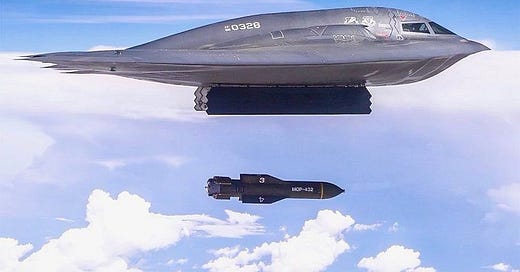The 30,000-pound message: America’s military edge is absolute
ANALYSIS BY CHRIS STEPHEN: With air superiority, tacit global backing and no legal limits, Trump held all the cards
By Chris Stephen
Trump’s shock airstrikes on Iran’s nuclear facilities were an operation straight out of his deal-making playbook: Play to win when you hold the best cards. In his tussle with Tehran, Trump was dealt a mighty good hand.
First was the advantage of Iran’s nuclear program being feared by just about every other country on the planet. Over four decades, Tehran has established itself as the leading sponsor of terrorism, its proxies — Hamas, the Houthis, Hezbollah and Shiite militias in Iraq — wreaking more havoc on their own people than on their enemies. While UN officials issued ritual condemnations of the bombing mission, that could not obscure the quiet relief felt in capitals around the world that Tehran won’t be joining the nuclear club just yet.
Then came the ace of military superiority. In recent years, the gulf in tech between America (and its allies) and the rest of the world has become a chasm. Israel managed to devastate Iran’s infrastructure in a week of airstrikes without losing a single plane. Former US presidents, tormented by Iran’s aggression — dating back to the 1979 hostage crisis and the 1983 Marine barracks bombing in Beirut — could only dream of having the means Trump had at his disposal.
Not least among them is the B-2, arguably the most sophisticated aircraft ever built. The GBU-57A/B Massive Ordnance Penetrator (MOP) they carried, a 30,000-pound behemoth, is the most powerful non-nuclear bomb in existence — possessed only by the United States. This ordnance is misunderstood: It didn’t need to drill through 90 meters of earth and rock to destroy Iran’s Fordow nuclear site. Halfway down was more than enough, since the colossal seismic shockwaves these bombs unleash can collapse tunnels far below.
A total of 125 US planes were involved. The B-2s were escorted by F-22 Raptor fighters, with the entire strike package wrapped in a cocoon of radar interference from electronic warfare planes. Their round-trip flight from Missouri, across the Atlantic and Mediterranean, was enabled by a fleet of US tankers based in Europe and the Azores. Meanwhile, other planes and drones conducted diversionary attacks, and a US submarine in the Gulf of Oman launched cruise missiles at two additional nuclear sites.
The whole thing was coordinated with Israel, which obligingly destroyed Iran’s last fighter planes the day before, eliminating even the slim chance they might intercept the bombers. And all of it was possible because Trump inherited an exceptionally advanced military machine. Pentagon chiefs told him he needed a second aircraft carrier near the Gulf to deter retaliation. The Nimitz arrived on Thursday. The strikes came the next day.
Trump also held a Get Out of Jail Free card: the strikes carry no legal consequences.
Technically, the operation likely violates the UN Charter, which permits war only in self-defense. Trump would struggle to argue the strikes were defensive — but he doesn’t have to. There’s no UN court to try him. At home, Republicans control both houses of Congress, and they’ll fend off any charges he overstepped the War Powers Act.
And finally, there’s Trump’s own reputation for unpredictability. Iran’s leaders watched him earlier this year hike America’s tariffs, only to quickly lower them when he got blowback—and likely assumed he was bluffing when he threatened action over their nuclear program.
They may also have failed to heed the implications of his warm meeting last month with Saudi Crown Prince Mohammed bin Salman. The desert kingdom, which has been dealing for years with a grinding proxy war against Iran-backed Houthis in Yemen, has almost as much to fear as Israel from a nuclear-armed Tehran. The smiles between the two likely signalled an understanding: Trump would act on Iran’s nukes, and MBS would ensure oil prices stayed low.
Perhaps Tehran, used to two decades of Western leaders issuing warnings they didn’t mean, assumed Trump would be the same.
They know different now. So does the world. That doesn’t mean Trump gets to run the board in foreign affairs — he was dealt an exceptional hand this time, and few games will be so one-sided. What it probably does mean is that, like Clausewitz, Trump sees war as negotiation by other means.
Chris Stephen, a veteran war correspondent in Bosnia, Libya and many other places, is also an expert on oil politics and international law. He is the author of The Future of War Crimes Justice, published in February 2024 by Melville House (London and New York) and Judgement Day: The Trial of Slobodan Milosevic (Atlantic Books, New York, 2005).




Thanks, pretty astute and dispassionate analysis of the situation and the people involved. As I read details of Operation Night Hammer, one thought that popped up was - just how many militaries in the world could see such an attack coming and actually be able to defend themselves against a layered aerial armada of death. Is this peak human lethal power? I sure hope so and hope to never be on the wrong side of it.